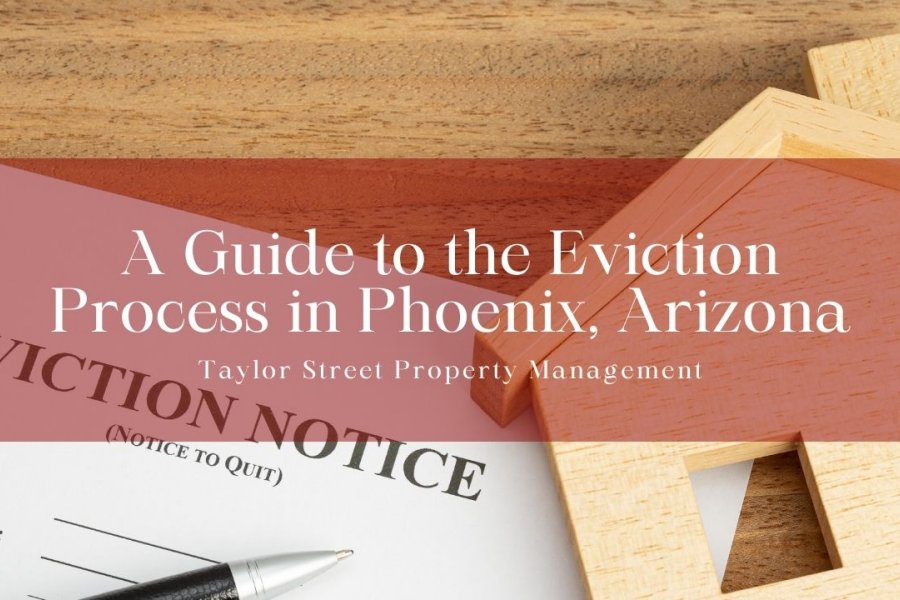A Phoenix, Arizona residential landlord uses the eviction process in Arizona as a last resort. The reasons for doing so can range from nonpayment of rent to violating the lease agreement and everything in between.
When evicting a tenant, the landlord has to follow the process outlined in the Arizona landlord-tenant act. In other words, you, as the landlord, cannot take matters into your own hands by, locking them out, cutting off their utilities, remove the tenant’s personal property, or harassing them as per the landlord and tenant act.
Those are all common examples of “self-help” eviction tactics and are illegal. Only a justice court or law enforcement officer can successfully evict a tenant. And even then, only the sheriff can force the tenant from the rental unit if the eviction lawsuit goes through which would involve court costs.
If you’re a landlord and want to learn more about the eviction system in Arizona, keep on reading!
Basic Overview of the Arizona Eviction Process
Legal Reason
To remove someone renting out a property, a landlord must have a legally justifiable reason. Therefore, a landlord cannot wake up one day and decide they no longer want the tenant in the rental property. This is because, as a landlord, you’ve signed a lease or rental agreement which is a contractual agreement that binds you and your tenant for a certain duration of time, usually one year.

Common reasons for an Arizona eviction lawsuit under the landlord tenant act include:
- Nonpayment of rent: If an Aizona landlords tenant stops paying rent for no good reason, they may be able to move to have them evicted as it would be considered violating the lease or rental agreement for unpaid rent.
- Disturbing other neighbors: The tenant has a responsibility to respect their neighbor’s peace and quiet. A landlord may be able to evict a tenant if they, for example, repeatedly throw noisy parties in the rented premises.
- Not moving after the lease or rental agreement ends: A tenant who fails to move out after their lease ends is referred to as a “holdover” tenant. If you, the landlord, no longer want to rent to them, you can have the tenant evicted.
- Excessive property damage: Most rental agreements require a tenant to return the unit in the same condition they found them. If an Arizona tenant causes excessive damage, a landlord may be able to evict them.
- Rental or lease violations by either or both the landlord and tenant. For example, If the tenant keeps unauthorized pets, for example, the landlord may be able to evict them.
Other violations include unauthorized rental property alterations and unauthorized subletting. Once a landlord has a legal reason, the next step is to post a written notice of eviction.
Eviction Notice
An eviction letter is a formal letter that lets a tenant know that the landlord has initiated their eviction from the property. When giving tenant notice, landlords must either directly hand it to their tenant or have it delivered by registered or certified mail. This will promptly notify the tenant of the violations they have committed and what they must do next.

Phoenix has various kinds of eviction notices and filing fees, each is specific to the violations committed:
- 5-Day Notice to Pay: For nonpayment of the monthly rent, a landlord must serve the tenant with a 5-Day Notice to Pay if they want to remove the tenant and recover any rent owed. This notice means the amount the tenant owes from the withhold rent must be paid back in 5 days or else they risk getting evicted. If the tenant fails to pay rent within the 5 days, the landlord can continue with the process. If the tenant pays, then you can choose to stop the process.
- 10-Day Notice to Comply: If the tenant violates the rental agreement terms, landlords must serve them with a 10-Day Notice to Comply. This notice gives the tenant 10 days to correct the issue to avoid getting evicted. Additionally, in Arizona, a landlord may also be able to evict a tenant for including misleading information on their rental application.
- 5-Day Notice to Comply: A landlord may also evict a tenant for health and/or safety violation. In this case, you must serve the tenant with a 5-Day Notice to Comply. This will give the tenant 5 days to cure the violation.
- 10-30 Day Notice to Quit: For a holdover tenant, the notice to serve them depends on the tenancy type. For weekly tenants, a landlord must serve them a 10-Day Notice to Quit. And for monthly tenants, there is a differant notice period. You must serve them a 30-Day Notice to Quit.
- Illegal Activity : Illegal activity as per Arizona revised statutes also violates the lease. Landlords must give their tenant proper notice before starting the eviction process. However, Arizona doesn’t state how much notice a you must give the tenant who is involved in it.

Summons & Complaint
If the tenant doesn’t comply with the eviction notice, a landlord must file a complaint in an appropriate court. In Arizona, summons are issued on the same day the complaint is filed.
A certified process server will then issue the summons to the tenant at least 2 days after you file an eviction.
Court Hearing & Eviction Judgment
Once the process server has issued the tenant with the summons, the eviction hearing will typically take place within 3 to 6 days. The court date for illegal activity such as a breach in federal law, however, will take place within 3 days.
A tenant can choose to file a written answer to the notice if they choose to. However, in Arizona, this isn’t required for the tenant to appear at the eviction hearing.
In the answer filing, a tenant may allege any of the following as a legal defense:
- The eviction process was carried out illegally and the eviction complaint was filed correctly with the Arizona courts. If the landlord fails to provide a legal reason, the judgment may not go in your favour.
- You didn’t follow the proper eviction procedure or violated applicable building codes.
- If you file an eviction after the tenant corrected the lease violation and so they shouldn’t be evicted.
- The complaint is a form of retaliation against the tenant if a landlord failed in their responsibilities or otherwise.
- The eviction is an act of discrimination.

Writ of Restitution
If the judgment is in your favor, the judge will issue you with a writ of restitution. A writ of restitution is a legal document that gives the possession of the rental unit back to the landlord. It gives the tenant anywhere between 12 hours and 5 days to move out or else they’ll be forcefully evicted and the tenant’s personal belongings will be removed.
Bottom Line: Evictions in Arizona
As an Arizona landlord you must understand the legal eviction process. You also need to stay up-to-date on landlord-tenant laws, Arizona leasing laws, Arizona security deposits laws and more.
If you would like help staying on top of all the laws or would like assistance managing your rental unit, contact the experts at Taylor Street Property Management today! Our property managers will be happy to answer any questions you may have.
Disclaimer: This blog should not be used as a substitute for legal advice from competent legal counsel licensed to help. Laws frequently change, and this post might not be updated at the time of your reading. Please contact an attorney if you need help or advice.


